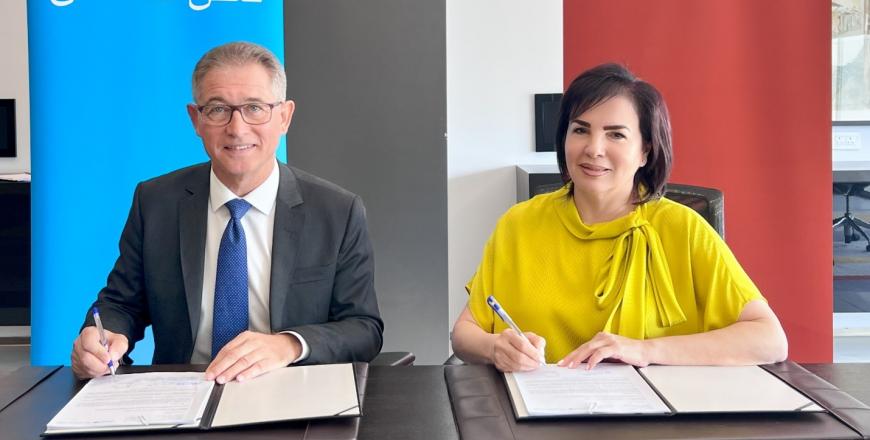You are here
Local Conference of Youth on Climate Change 2024 concludes
By JT - Oct 09,2024 - Last updated at Oct 09,2024

The conference aims to raise environmental awareness, and highlight innovative youth-led projects and initiatives addressing the impacts of climate change (UNICEF photo)
AMMAN — The 2024 Local Youth Climate Change Conference (LCOY) concluded on Wednesday after two days of panel discussions on the impact of climate change on vital sectors, the role of youth in climate action, and the intersection of climate and youth.
The panels also focused on peace and security, and the role of civil society organisations in supporting climate initiatives, according to a UNICEF statement for The Jordan Times.
The two-day conference was organised by the Ministry of Youth and the Ministry of Environment, in partnership with UNICEF, Generations for Peace (GFP), and Al Hussein Technical University, and was supported by Bank al Etihad and Korea International Cooperation Agency (KOICA).
The conference aimed to raise environmental awareness, highlight innovative youth-led projects and initiatives addressing the impacts of climate change and empower young people to engage with decision-makers in shaping policies and taking effective climate actions.
It provided a platform for youth to propose alternatives and solutions to tackle climate change, supporting youth-led green innovations and projects.
The fourth edition of the LCOY conference was attended by HH Princess Dana Firas, President of the Petra National Trust and UNESCO Goodwill Ambassador for Cultural Heritage, Minister of Youth Yazan Shdaifat, Minister of Environment Muawiyah Radaideh, UNICEF Representative to Jordan Philippe Duamelle, and GFP CEO Lama Hattab.
President of Al Hussein Technical University Ismail Hunaiti, KOICA Country Director in Jordan Soyoung Kim, and Nadia Al Saeed, Chief Executive Officer of Bank al Etihad, also attended the event.
Princess Dana led a workshop on the intersection of environment and heritage, and said: “We are pleased to see youth and partners engaging in such conferences, which serve as vital platforms to highlight the close connection between cultural heritage and climate change."
"It is essential to inspire young people to be part of these efforts, as raising awareness about climate change and preserving our heritage is a shared responsibility that protects our cultural identity and promotes environmental sustainability,” the princess added.
Radaideh highlighted Jordan’s significant efforts to enhance environmental performance and achieve sustainability, despite growing environmental challenges.
The minister added that these initiatives underscore the country’s strong commitment to climate policies that improve quality of life, protect the environment, and boost resilience against climate change.
He emphasised that Jordanian youth play a crucial role in these efforts, actively contributing to environmental initiatives and promoting climate awareness.
Shdaifat stressed the importance of environmental issues within the ministry's youth-focused initiatives, noting various programmes that address climate change, green economy, food security, and green initiatives, as well as entrepreneurial environmental forums.
In response to a question on the role of youth centres in advancing climate action, he outlined the ministry's strategy to enhance the role of youth centres by expanding the inclusiveness of their programmes and establishing business incubators across all governorates to support youth-led climate initiatives.
Duamelle said: "In Jordan, youth are a driving force that is eager to contribute to the sustainable development of the country. Led by young people from across the Kingdom, the Local Conference of Youth 2024 is an illustration of how they can contribute to developing sustainable climate change solutions.”
During a session on the role of NGOs in supporting climate action, Hattab reaffirmed GFP’s ongoing commitment to raising awareness about climate change and environmental issues among youth.
She said: “We operate within a comprehensive, participatory approach, based on our belief that reducing emissions and adapting to the impacts of climate change in Jordan require a national strategy that includes all stakeholders: the government, private sector, civil society organisations, and international bodies.
Related Articles
AMMAN — Jordanian youth are calling for climate change to be recognised as an agricultural risk and encouraging society to view tackling cli
AMMAN – UNICEF and Bank al Etihad have renewed their partnership for a second year to continue empowering young people in Jordan to engage i
AMMAN — UNICEF Jordan, through its Sawn programme, leverages the enthusiasm and insights of Jordanian youth to accelerate global efforts in














